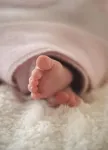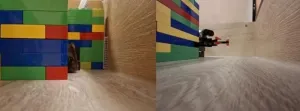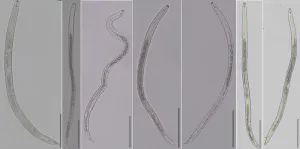(Press-News.org) A hidden world teeming with life lies below beach sands. New Stanford-led research sheds light on how microbial communities in coastal groundwater respond to infiltrating seawater. The study, published Dec. 22 in Environmental Microbiology, reveals the diversity of microbial life inhabiting these critical ecosystems and what might happen if they are inundated by rising seas.
“Beaches can act as a filter between land and sea, processing groundwater and associated chemicals before they reach the ocean,” said study co-first author Jessica Bullington, a Ph.D. student in Earth system science in the Stanford Doerr School of Sustainability. “Understanding how these ecosystems function is key to safeguarding their services in the face of sea level rise.”
The research team conducted the intensive study at Stinson Beach, north of San Francisco. Stinson Beach is representative of a “high-energy” beach, which has only a handful of previous papers on the microbiome worldwide.
Microbial guardians
Microbial communities living in groundwater within beach sand play a crucial role in maintaining coastal water quality. These microbes help break down chemicals, including excess nutrients like nitrogen, which can come from natural sources, such as decomposing plant matter, or human sources, like agricultural runoff and wastewater.
To better understand the dynamics of this microbial filtering system, the research team headed to Stinson Beach. Over two weeks, during both a wet and dry season, they collected samples from the beach’s subterranean estuary around the clock to capture changing tides. Then, the researchers analyzed the microbial DNA using advanced gene sequencing techniques. This approach – the first of its kind at such a fine time scale – provided unprecedented insight into the microbial community’s composition and stability.
The researchers found that the microbial communities remained relatively stable over changing tidal conditions and seasons. However, a wave overtopping event – when seawater surged into the aquifer due to high-energy waves – caused significant changes in the microbial makeup. Such disturbances are expected to become more frequent with rising sea levels and storm surges, making it harder for the microbes to do their water purification work.
“These microbes live in complex communities, many with specialized roles that include processing nutrients and even producing or consuming greenhouse gases,” said co-senior author Christopher Francis, a professor of Earth system science and of oceans in the Stanford Doerr School of Sustainability. “The microbial community’s resilience under typical conditions is encouraging, but disturbances like wave overtopping highlight their vulnerability to climate change,” said co-first author Katie Langenfeld, a postdoctoral scholar in civil and environmental engineering at Stanford at the time of the research and current postdoctoral fellow at the University of Michigan.
Implications for coastal resilience
The study’s findings establish a critical baseline for understanding how subterranean estuaries function and respond to environmental changes. As sea levels rise, beach sands will be forced inland or erode, altering groundwater hydrology, chemistry, and microbial composition.
The research adds a crucial piece to the puzzle of coastal resilience. By highlighting the interplay between microbial dynamics and physical processes like wave action, the study brings into question impending changes to coastal groundwater. Policymakers and coastal planners should consider the role of these hidden ecosystems when designing strategies to manage sea level rise, according to the researchers.
“We rely on these microbial communities for essential biogeochemical cycling at the land-sea interface,” said co-senior author Alexandria Boehm, the Richard and Rhoda Goldman Professor of Environmental Studies in the Stanford Doerr School of Sustainability and the Stanford School of Engineering. “If their capacity diminishes due to climate impacts, we could see cascading effects on coastal water quality and marine life.”
Acknowledgements
This work was supported by the National Science Foundation, the Stanford University McGee and Levorsen Research Grant, and ARCO Stanford University Graduate Fellowship.
END
Beach guardians: How hidden microbes protect coastal waters in a changing climate
2025-01-14
ELSE PRESS RELEASES FROM THIS DATE:
Rice researchers unlock new insights into tellurene, paving the way for next-gen electronics
2025-01-14
HOUSTON – (Jan. 14, 2025) – To describe how matter works at infinitesimal scales, researchers designate collective behaviors with single concepts ⎯ like calling a group of birds flying in sync a “flock” or “murmuration.” Known as quasiparticles, the phenomena these concepts refer to could be the key to next-generation technologies.
In a recent study published in Science Advances, a team of researchers led by Shengxi Huang, associate professor of electrical and computer engineering and materials science and nanoengineering at Rice, describe how one such type of quasiparticle ⎯ polarons ⎯ behaves in tellurene, a nanomaterial first synthesized ...
New potential treatment for inherited blinding disease retinitis pigmentosa
2025-01-14
Two new compounds may be able to treat retinitis pigmentosa, a group of inherited eye diseases that cause blindness. The compounds, described in a study published January 14th in the open-access journal PLOS Biology by Beata Jastrzebska from Case Western Reserve University, US, and colleagues, were identified using a virtual screening approach.
In retinitis pigmentosa, the retina protein rhodopsin is often misfolded due to genetic mutations, causing retinal cells to die off and leading to progressive blindness. Small molecules to correct rhodopsin folding are urgently needed to treat the estimated 100,000 ...
Following a 2005 policy, episiotomy rates have reduced in France without an overall increase in anal sphincter injuries during labor, with more research needed to confirm the safest rate of episiotomi
2025-01-14
Following a 2005 policy, episiotomy rates have reduced in France without an overall increase in anal sphincter injuries during labor, with more research needed to confirm the safest rate of episiotomies and the risks to specific subgroups
In your coverage, please use this URL to provide access to the freely available paper in PLOS Medicine: http://journals.plos.org/plosmedicine/article?id=10.1371/journal.pmed.1004501
Article title: Episiotomies and obstetric anal sphincter injuries following a restrictive episiotomy policy in France: An analysis of the 2010, 2016, and 2021 National Perinatal Surveys
Author countries: France, Switzerland
Funding: ...
Rats anticipate location of food-guarding robots when foraging
2025-01-14
Researchers find that rats create neurological maps of places to avoid after experiencing a threat and think about these locations when exhibiting worry-related behaviors. These findings—which A. David Redish of the University of Minnesota, US, and colleagues presented in the open-access journal PLOS Biology on January 14th—may provide insight into the neuroscience of common psychological conditions like anxiety.
There are many theories as to why people experience anxiety. One is that anxiety is associated with a psychological phenomenon called “approach-avoidance conflict,” where ...
The American Association for Anatomy announces their Highest Distinctions of 2025
2025-01-14
ROCKVILLE, MD—January 14, 2025—The American Association for Anatomy (AAA) is thrilled to announce the recipients of their 2025 Spring Awards. Each awardee will be formally recognized at the Anatomy Connected 2025 Closing Awards Ceremony on March 31, in Portland, Oregon.
The Spring Awards include the three highest distinctions awarded by AAA: the Henry Gray Scientific Award, the A.J. Ladman Exemplary Service Award, and the Henry Gray Distinguished Educator Award. The winners of these awards, along with the others on this list, are gathered through a nomination process conducted by their peers ...
Diving deep into dopamine
2025-01-14
Positive feedback is helpful for learning, but usually, our greatest lessons actually come from failure— and a new project at the University of Pittsburgh aims to uncover the neural mechanisms behind this phenomenon.
Helen Schwerdt, assistant professor of bioengineering at Pitt’s Swanson School of Engineering, received a five-year, $2.5 million R01 award from the National Institutes of Health (NIH) to study dopamine’s role in learning. Schwerdt’s team develops novel multimodal neural interfaces ...
Automatic speech recognition on par with humans in noisy conditions
2025-01-14
Automatic speech recognition (ASR) has made incredible advances in the past few years, especially for widely spoken languages such as English. Prior to 2020, it was typically assumed that human abilities for speech recognition far exceeded automatic systems, yet some current systems have started to match human performance. The goal in developing ASR systems has always been to lower the error rate, regardless of how people perform in the same environment. After all, not even people will recognize speech with 100% accuracy in a noisy environment.
In a new study, UZH computational linguistics specialist Eleanor Chodroff and a fellow researcher from Cambridge ...
PolyU researchers develop breakthrough method for self-stimulated ejection of freezing droplets, unlocking cost-effective applications in de-icing
2025-01-14
Water droplets under freezing conditions do not spontaneously detach from surfaces as they do at room temperature due to stronger droplet-surface interaction and lack of an energy transformation pathway. Since accumulated droplets or ice have to be removed manually or with mechanical equipment, which is costly and inefficient, preventing droplet accretion on surfaces is both scientifically intriguing and practically important. Researchers at The Hong Kong Polytechnic University (PolyU) have invented a ground-breaking self-powered mechanism of freezing droplet ejection that allows droplets to ...
85% of Mexican Americans with dementia unaware of diagnosis, outpacing overall rate
2025-01-14
More than three-quarters of older adults with dementia may be unaware of their diagnosis, a University of Michigan study finds.
That number is even higher — up to 85% — among Mexican Americans, who make up the largest share of the U.S. Hispanic and Latino population.
Fewer than 7% of all study participants, who live in Nueces County, Texas and were classified as having probable dementia based on a cognitive assessment, did not have a primary care provider.
The results are published in the Journal of General Internal Medicine.
“Dementia diagnosis unawareness is a public health issue that must be addressed,” ...
Study reveals root-lesion nematodes in maize crops - and one potential new species
2025-01-14
A new study has lifted the lid on five species of root-lesion nematodes living in maize crops across New Zealand - and suggested the existence of a hitherto-unsuspected cryptic species.
The article, ‘Molecular characterization of root-lesion nematode, (Pratylenchus spp.) and their prevalence in New Zealand maize fields’, is published in Letters in Applied Microbiology, an Applied Microbiology International publication.
Identifying these nematodes and understanding their distribution will enable targeted pest management strategies, helping to protect crop yields and maintain agricultural ...






